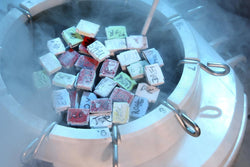

We get it; many of us enjoy unwinding with a drink or two at the end of a long day. We all drank a bit too much during the pandemic, and old habits die hard. However, while moderate alcohol consumption may seem harmless, it's essential to understand its potential impact, especially when it comes to matters as crucial as fertility. For men aspiring to start a family or focusing on sperm health for the future, alcohol's impact on male fertility can be a sobering reality worth exploring.
Understanding Male Fertility
Before delving into the effects of alcohol, let's grasp the basics of male fertility. Fertility in men relies on various factors, including sperm quality and quantity. Sperm count, motility (movement), and morphology (shape) are crucial male reproductive health indicators. Any disruptions to these parameters can significantly affect fertility.
The Role of Alcohol
Alcohol, a commonly consumed substance worldwide, has been subject to extensive research regarding its effects on human health. When it comes to fertility, alcohol consumption can disrupt the delicate balance within the male reproductive system. While occasional, moderate drinking might not pose significant threats, excessive or chronic alcohol intake can lead to adverse effects on male fertility. Currently, alcohol consumption is broken down into four groups.
Current use |
≥ 1 drink in the past 30 days |
Moderate use |
Up to 1 drink per day for women, up to 2 drinks per day for men |
Binge drinking |
Drinking a quantity of alcohol to raise the BAC to 0.08 g/dL - typically 4 drinks for women and 5 drinks for men in 2 h |
Heavy alcohol use |
Binge drinking on ≥5 days in the past month |

Alcohol's Impact on Sperm Quality
Research suggests that alcohol consumption can impair sperm quality in several ways. One of the primary concerns is its influence on sperm count. Excessive alcohol intake has been associated with decreased sperm count, which can directly impact fertility potential. Moreover, alcohol can also affect sperm motility, making it harder for sperm to reach and fertilize the egg. Additionally, abnormalities in sperm morphology have been linked to alcohol consumption, further diminishing fertility prospects.
Hormonal Disruption
Alcohol can disrupt hormonal balance within the body, which plays a crucial role in regulating reproductive function. Chronic alcohol consumption can lead to elevated estrogen levels and decreased testosterone levels in men. This hormonal imbalance can adversely affect sperm production and quality, ultimately impacting fertility.
Testicular Function
The testes play a central role in sperm production. Alcohol consumption can interfere with testicular function, leading to impaired sperm development and maturation. Chronic alcohol use has been associated with testicular atrophy, a condition characterized by the shrinking of the testes, which can significantly impair fertility.
Oxidative Stress
Another mechanism through which alcohol affects male fertility is oxidative stress. Alcohol metabolism produces reactive oxygen species (ROS), which can cause damage to sperm cells. Increased oxidative stress can lead to sperm DNA damage, reducing fertility and increasing the risk of miscarriage or birth defects in offspring.
Timing and Moderation
While the harmful effects of excessive alcohol consumption on male fertility are evident, moderation and timing also play significant roles. Occasional, moderate alcohol intake may not have a substantial impact on fertility in some individuals. However, for men actively trying to conceive, minimizing alcohol consumption is advisable to optimize fertility potential.
Seeking Support
For men concerned about their fertility or experiencing difficulties conceiving, seeking professional medical advice is crucial. Fertility specialists can provide personalized guidance and recommendations tailored to individual circumstances. Lifestyle modifications, including reducing alcohol consumption, may be part of a comprehensive approach to improving fertility outcomes.
The relationship between alcohol consumption and male fertility is complex, with excessive intake posing potential risks to reproductive health. While occasional, moderate drinking may not significantly impact fertility in some men, chronic alcohol abuse can lead to detrimental effects on sperm quality, hormonal balance, testicular function, and oxidative stress. For men aspiring to start a family, minimizing alcohol consumption and adopting a healthy lifestyle are essential steps toward optimizing fertility potential. By prioritizing reproductive health and seeking appropriate support when needed, men can embark on the journey to fatherhood with confidence and well-being.




